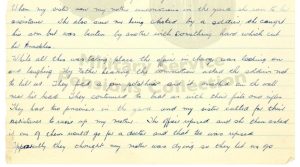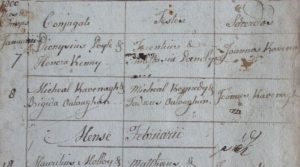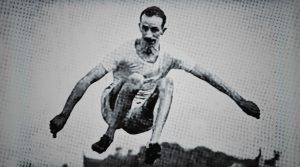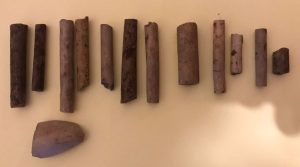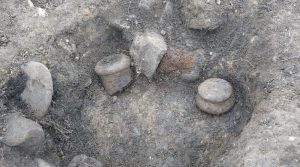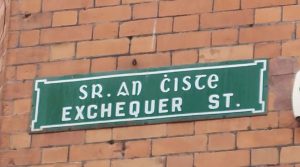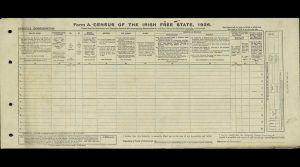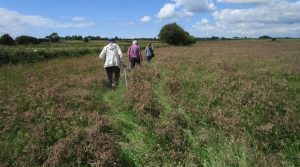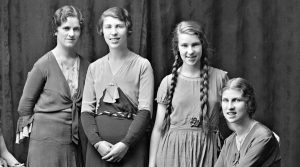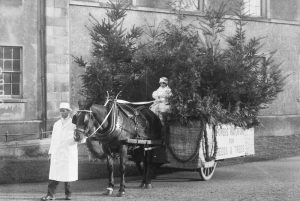Each week, SAY IT IN IRISH features an Irish or Hiberno-English word or phrase, exploring its meaning, history and origins – with an audio recording by a native Irish speaker from Cork so you can hear how it’s pronounced.
Bacach
The Irish word bacach serves both as an adjective and a noun. As an adjective, it means “lame”, “halting” or “limping”, while as a noun, it refers to “a lame person” or “a beggar”. The word appears in Irish texts from the early medieval period and likely derives from bac, meaning “hinder” or “balk”. So, bacach essentially described someone whose movement was hindered.
Say “lame” or “beggar” in Irish: bacach
Bacach – pronounced roughly ba-cock
Press play to hear the pronunciation:
>
In Gaelic Ireland, bacach was commonly used as a descriptive nickname for individuals with a limp or some other type of mobility impairment, whether caused by illness, injury or a congenital condition. One notable example is Conn Bacach Ó Néill (c.1484–1559), the 1st earl of Tyrone. The nickname sometimes persisted down through the generations, even when the physical ailment did not.
Listen below to a performance of An Lacha Bhacach (“The Lame Duck”) sung by Nell Ní Chróinín and Máire Ní Chéilleachair.
Over time, the word bacach also came to refer to a beggar, probably reflecting the historical reality that those with disabilities were often forced into begging as a means of survival. Professional bacachs travelled the countryside, exchanging news and stories for food and a place to sleep.
The word bacach gradually acquired derogatory connotations and, in certain contexts, came to refer to a mean or despicable person or a sponger. In Hiberno-English, it is sometimes used as a mild insult – “You little bacach you!” – though the term is not widely heard today. An account in the late 1930s’ Schools Folklore Collection from Kilcavan, Co. Wexford, highlights an attitude of disdain directed towards the bacachs:
“The Bacacs were a bad race of men who used go around in the old times. They were lame, the lameness sometimes feigned and sometimes self-inflicted to arouse the sympathy of the people. They cast spells on young women.”
Sign up to our newsletter
In the 18th and 19th centuries, bacachs were a common sight at pilgrimage sites across Ireland, particularly on saints’ feastdays and pattern days. Early church sites, such as St Gobnait’s in Ballyvourney, Co. Cork and St Declan’s in Ardmore, Co. Waterford, were especially well attended by bacachs. In fact, bacachs were so numerous at Ballyvourney that they earned the nickname Cléire Gobnaiti (Gobnait’s Clergy), and Ballyvourney even earned the nicknames Baile Mhúirne na mBacach and “Ballyvourney of the Beggars.”
>>> YOU MIGHT ALSO LIKE: St Gobnait: patron saint of ironworkers, beekeepers and Ballyvourney
An interesting account of the bacach is found in an article by William Hackett, “The Irish bacach, or professional beggar, viewed archaeologically”, published in the Ulster Journal of Archaeology in 1861–62. Hackett describes a brotherhood or secret society of highly organized, professional bacachs who played a spurious role in promoting pilgrimages at certain sites, apparently by claiming false cures. In exchange for alms, the bacachs performed a particular crónán, or chant, believed to have healing powers. Their influence was such that they attracted huge crowds from far and wide.
>>> YOU MIGHT ALSO LIKE: Say “humming” in Irish: crónán
Upon mastering their craft, a bacach was presented with a blackthorn stick studded with brass nails, with the number of nails signifying the supposed effectiveness of the bacach’s crónán and, by extension, his healing abilities.
A D V E R T I S E M E N T
By the 1860s, the bacach tradition was in steep decline, though traces of it persisted into the 20th century. In notes compiled by Fr Hurley between 1945 and 1950, the former parish priest of Ballyvourney, he recorded that the bacachs of Muskerry still gathered on pattern day at St Abbán’s grave in Shanacloon, just outside Ballyvourney, to elect their ruler for the following year. The ruler was responsible for settling disputes and assigning to each bacach the region wherein he was permitted to beg.
Although the number of bacachs attending pilgrimages dwindled considerably in the late 19th and 20th centuries, their door-to-door begging activities and their appearances at large gatherings continued to some extent. In Co. Clare, in particular, uninvited guests at weddings were called bacachs, and their antics more closely resembled those of the strawboys than those of traditional bacachs.
Please help support
Irish Heritage News
A small independent start-up in West Cork
Give as little as €2
Thank You
For instance, the late 1930s’ Schools Folklore Collection records several accounts from Co. Clare of men or boys dressing up as “bacacs” and attending wedding parties uninvited. Disguised with masks and straw, they would sometimes dance with the bride and, in return, receive either money or food (often meat). In Drumdigus, Co. Clare, it was recorded:
“The weddings used to be attended by parties of “bacacs” (strawboys) disguised in fantastic manner, who added considerably to the general enjoyment. The custom of ‘going in the bacacs’ has not yet ceased, but the opportunities of doing so are now rare.”
Similar traditions were noted elsewhere in Clare, including in Kildeema, Tullycreen Upper and Doonaha, although in the latter case, the bacachs were not always allowed to enter. In Cloonadrum, also in Clare, a party was held at the bride-to-be’s house on the night before the wedding. All invited friends attended, while those uninvited came disguised as bacachs or strawboys. They would demand one dance, and all those already on the floor had to give way and allow them to dance.
Listen below to a performance of Bacach Shíol Andaí by Ye Vagabonds.
Bockety
The Hiberno-English adjective “bockety” or “bockedy”, meaning “unsteady”, “wobbly” or “wonky”, appears to derive from the Irish bacaidí, itself deriving from bacach. It can be used as follows: “One of the legs of the table is bockety”.
A D V E R T I S E M E N T
Alternatively, bockety could represent a fusion of bacach with the English word “rickety”, meaning poorly made and likely to collapse.
According to the Oxford English Dictionary, this loan word from Irish entered English usage in the 19th century.
Say “bockety” in Hiberno-English:
Bockety – pronounced bock-i-tee
Press play to hear the pronunciation:
READ NOW
➤ Limerick company Bitesize Irish launches online course teaching traditional Irish songs
➤ Bandle stone at Noughaval – a remnant of an abandoned settlement and market in Clare
➤ The cuckoo in Irish folklore
A D V E R T I S E M E N T






